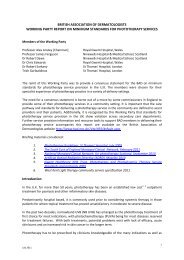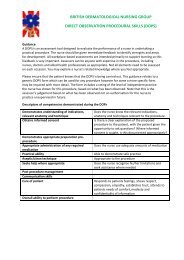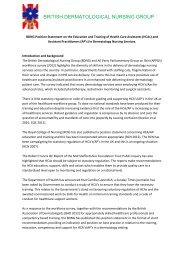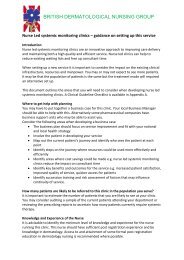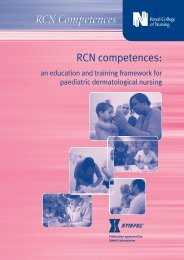Improving outcomes for people with skin tumours including melanoma
Improving outcomes for people with skin tumours including melanoma
Improving outcomes for people with skin tumours including melanoma
Create successful ePaper yourself
Turn your PDF publications into a flip-book with our unique Google optimized e-Paper software.
One systematic review (of the ability of primary care physicians and<br />
dermatologists to diagnose <strong>melanoma</strong>, and to make correct decisions<br />
on biopsy and referral) included 32 primary studies, from a variety of<br />
countries. The review concluded that the data from primary studies<br />
were inadequate to show differences between dermatologists and GPs<br />
in these diagnostic and decision-making <strong>outcomes</strong>.<br />
<strong>Improving</strong> Outcomes <strong>for</strong><br />
People <strong>with</strong> Skin Tumours<br />
<strong>including</strong> Melanoma<br />
Organisation of <strong>skin</strong><br />
cancer services<br />
One systematic review of 14 US primary studies found that<br />
dermatologists per<strong>for</strong>med significantly better than non-dermatologist<br />
doctors in the diagnosis of images of benign and malignant <strong>skin</strong><br />
lesions.<br />
In the patient survey commissioned <strong>for</strong> this guidance there was<br />
evidence that diagnosis had been delayed <strong>for</strong> a number of patients by<br />
GPs who failed to recognise the severity of the lesions or who<br />
removed lesions inadequately. The patients wanted to see improved<br />
education in <strong>skin</strong> cancer <strong>for</strong> GPs as one way of improving services.<br />
Three observational studies found that GPs were more likely to<br />
per<strong>for</strong>m incomplete excisions of <strong>melanoma</strong> <strong>tumours</strong>. One study also<br />
found that some GPs do not routinely obtain histological examination<br />
of <strong>skin</strong> lesions that they believe to be benign. Audits have shown that,<br />
when GPwSIs work to an agreed protocol dealing only <strong>with</strong> low-risk<br />
lesions, the incomplete excision rate is comparable to hospital<br />
specialty rates.<br />
3<br />
One retrospective study examined <strong>outcomes</strong> <strong>for</strong> patients <strong>with</strong><br />
<strong>melanoma</strong> by the type of clinician per<strong>for</strong>ming initial treatment. This<br />
study found that, when adjusted <strong>for</strong> prognostic factors, patients<br />
treated by GPs had poorer overall survival, disease-free survival and<br />
recurrence-free interval than patients treated by dermatologists.<br />
However, these differences were not statistically significant.<br />
In an expert paper submitted by the British Association of<br />
Dermatologists (BAD) there was support <strong>for</strong> the training of GPwSIs by<br />
consultant dermatologists in diagnostic skills <strong>for</strong> benign and malignant<br />
<strong>skin</strong> <strong>tumours</strong>. It also recommended maintaining close links <strong>with</strong> the<br />
local dermatology and histopathology departments.<br />
Nurses<br />
Guidelines produced by the British Association of Plastic Surgeons<br />
and the NHS Modernisation Agency recommend that more nurse<br />
specialist posts should be created and supported by adequate funding.<br />
Guidance on cancer services: <strong>skin</strong> <strong>tumours</strong> <strong>including</strong> <strong>melanoma</strong><br />
69




